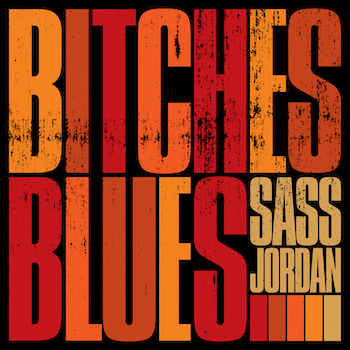
Photo: Sass Jordan Michiel Driediik
By Ellie Rogers
Canadian singer-songwriter Sass Jordan has always been known for her ability to rock out. Her gritty vocals earned her a Juno award for Most Promising Female Vocalist in 1989, she toured with the young Taylor Hawkins before he became a member of Foo Fighters, has duetted with Joe Cocker, and even starred as the lead role of Janis Joplin in the off-Broadway hit Love, Janis in 2001.
In recent years, however, she’s been exploring the moodier colourations of the blues with dazzling success. In 2020, she dropped Rebel Moon Blues and collected armfuls of complimentary reviews for it. Now, she’s picking up right where she left off with another true blue offering in the form of Bitches Blues, which is due for release on Friday June 3rd via Stony Plain Records.
The album, which was produced by Sass’s partner in life and music, Derek Sharp, consists of five reverentially captured covers and three original tracks. Clocking in at just about 28 minutes, it’s a compact but gutsy offering that certainly spares no time of day for filler content whatsoever.
The opening track – a cover of Rick Derringer’s ‘Still Alive and Well’ – whirls into life with a Hammond organ vamp played by Jesse O’Brien before the drums, guitar riff and instantly recognisable voice of Sass Jordan kick in with full force. It’s a triumphant declaration of survival that will no doubt strike a chord with many in the still-fresh wake of the global pandemic. A highlight of this emphatically joyous blues rock romp, comes in the form of some fiery lead guitar work from both Chris Caddell and Jimmy Reid, which plays out as half duet and half duel.
Next up comes a rendition of the blues staple, ‘Chevrolet.’ Originally recorded by Ed and Lonnie Young in 1959, the song has been covered over the years by the likes of Taj Mahal, Robben Ford and The Derek Trucks Band to name just a few. It’s simply part of the canon, and that can be a daunting prospect for an artist. Still, Sass and co more than do justice to the classic. The rustic percussion that opens the track offers a knowing nod to the original, while Chris Caddell’s slide guitar takes you straight to the Delta. A healthy dose of squawking harmonica also provides a nice counterpoint to Jordan’s raspy vocal tones.
‘Even’ is a reworking of the closing track from Jordan’s 2008 record You Get What You Give and it offers a change in pace and style – this time with a heavily swung juke-joint style piano powering the track, rather than rocking guitars and drums. The song has an organic, live feel that instantly transports you to an intimate gig in a smoky bar, and we’d be willing to bet it was recorded without the stifling regimentation of a studio click track. At the end, the still rolling tape captures a joyful “Yeehaw!” from Sass, followed by “That was fun!” And she’s not wrong – it’s a homespun home run of a tune.
Another of the album’s original tracks comes in the form of ‘Still The World Goes Round’, which is credited to Jordan and guitarist Chris Caddell. Here we have some commentary on the state of the modern world (“People gotta stand up / People gotta shout / People, take your power back ‘cause that’s your ticket out”) but it sits comfortably with its elder album-mates thanks to some sympathetically vintage style production, a foot-stomping country blues feel, tasty group vocals and some nimble slide guitar work.
A cover of Fred McDowell’s “You Gotta Move” sends the record right back to mid-century Mississippi, and the mournful lyrics seem to lend themselves particularly well to Sass’s relaxed but powerful vocal style, and some tasteful reflections of the melody on slide guitar give that classic call and response feel. Perhaps what makes the track, though, is the decision to feature sparse percussion, rather than full kit drums from Cassius Pereira. Rustic vibes are the order of the day here, and it all comes together with a very natural charm.
The clink of glasses and the sound of bar room chatter heralds the start of the Little Feat classic, ‘Sailin’ Shoes’. Some of Jordan’s pronunciation on this one gets a little slurred – possibly as a deliberate attempt to enhance the late night, boozy atmosphere of the song’s introduction – but it’s still a great performance throughout. The track features a sterling piano solo from O’Brien and the funky southern groove is a real winner.
Listen to “Still Alive and Well”
Track number 7 delivers an attitude-stuffed rendition of Little Milton’s ‘Ain’t No Big Deal On You’ which bears more sonic resemblance to the later Freddie King version, thanks to some piercing lead guitar work that evokes Freddie’s trademark big bends and vibrato style. An ode to getting over your ex and coming out the other side all the better for it, Sass sounds as if she particularly enjoys delivering the main vocal refrain, and this is a track best enjoyed with the volume turned up (in earshot of your ex, naturally).
The last track, ‘Change Is Coming,’ is the third and final original song, and it offers a message of optimism as a closing thought. No other track could have resolved the record as effectively. It begins with an electric sitar intro that slides (literally) into a Delta blues feel, and there’s some great gutsy, distorted harmonica work from Steve Marriner. Again, opting for a percussive approach, rather than a fat beat on a full drum kit is a wise and sensitive choice.
From start to finish, Bitches Blues is a terrific listen and Jordan deftly swerves many of the overdone cliches and tropes that can befall those brave enough to take on classic blues tunes. Her rock roots shine through at times, but there’s enough restraint to convey a full spectrum of moods and emotions.
The three original songs show-off Jordan’s writing talents, and the prevailing rootsy arrangements give more gravitas to the lyrical content than perhaps the heavier, rockier songs elsewhere in her catalogue do. If anything, it would be great to have a few more originals on Bitches Blues, but let’s not be greedy – there’s always another album for that.

Pre-order link for Bitches Blues

Interesting review! Enjoyed! Sass does justice to Johnny Winter’s classic.